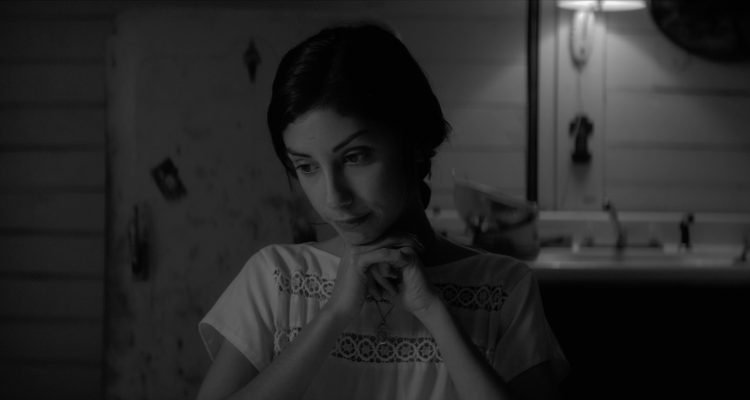The opening 10 minutes of writer-director Nicolas Pesce’s “The Eyes of My Mother” plays like the art-film version of an old EC Comics horror story — like one of those “Vault of Horror” or “Tales from the Crypt” eight-pagers where a monster gets its comeuppance at the claws of an even bigger monster. In a remote American farmhouse in the mid-20th century, a Portuguese surgeon-turned-housewife makes the mistake of allowing a creepy drifter named Charlie ( Will Brill) into her home, where he commits an act of unspeakable violence. But then her taciturn farmer husband arrives on the scene, and Charlie discovers that there some people are capable of conceiving of even more depraved things to do to human beings than he can. Pesce shoots this little vignette in stark black and white, with static, clinical framing, and minimal sound beyond the moans and thrashing of the victims. It’s a brutal, horrifying way to start a movie. And it’s only the beginning.
READ MORE: Check Out All Of Our 2016 Sundance Film Festival Coverage Here
It’s hard to explain exactly what “The Eyes of My Mother” is. Pesce is a next-generation addition to the collective at Borderline Films, whose Sean Durkin, Antonio Campos, and Josh Mond are responsible for some of the most exciting American art films of the past decade — visionary hybrids of character sketch and genre exercise like “Martha Marcy May Marlene,” “Afterschool,” “Simon Killer,” and “James White.” “The Eyes of My Mother” has a lot in common with those movies, in that Pesce takes full advantage of every tool available to him, from sound to lighting to acting, to create something that’s artfully textured, visually gorgeous, and thoroughly gripping. And his film is also, ultimately, an exploration of one person’s fractured psyche.
The person in question is Francisca, played as a little girl by Olivia Bond and as a young woman by Kika Magalhaes. Francisca mutely witnesses what happens to her mother, and then is an active participant in what happens to Charlie, on whom she practices some of the surgical techniques she picked up from her mom. Then she grows up and watches her dad get older and more decrepit, leaving her alone and unprepared to live in society. As played by Magalhaes, Francisca is practically an alien creature who moves with a halting, inhuman precision, and has no idea how to talk to other people. As her loneliness intensifies, she decides to make an effort to find some friends who might want to join her on her farm. But as Charlie can attest, Francisca has some curious ideas about what “companionship” means.
So if the first 10 minutes of “The Eyes of My Mother” is like a single EC Comics story, the remaining 67 are like an extended epilogue, showing what comes next for the monsters who devour other monsters. Or maybe an even better comparison would be classic “wrong turn” horror films like “The Texas Chainsaw Massacre” or “The People Under the Stairs,” where ordinary folks who make the mistake of knocking on the worst possible doors. “The Eyes of My Mother” is kind of like an origin story for the psychopaths those unlucky fools stumble on.
The big question though is whether there’s a point to all this. Squeamish and skittish moviegoers can often tolerate a lot of shock and gore if there’s some emotional or thematic payoff. And unlike recent horror sensations like “The Babadook,” “It Follows,” or “The Witch,” it’s hard to argue that “The Eyes of My Mother” has much to say. To some extent it’s a portrait of extreme alienation, following the deeply Catholic, sloppily parented Francisca as she converts her limited understanding of the world into unintentional evil. But really this film is about Pesce following a kind of nightmare logic for an hour and fifteen minutes, imagining one terrible scenario and then trying to think of what might happen next that could be even worse.
As such, “The Eyes of My Mother” won’t be for everyone. Anyone who prefers movies with recognizably human characters who behave rationally need not buy a ticket. But for fans of the “extreme cinema” of filmmakers like Kim Ki-Duk and Takashi Miike, “The Eyes of My Mother” is a must-see. It’s intense as hell, and a supreme example of how the morally repugnant can be made to look weirdly beautiful. [B+]
Click here for our complete coverage from the 2016 Sundance Film Festival

